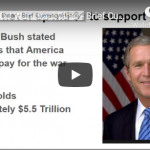Sweden cuts rates below zero as global currency wars spread
Morgan Stanley warns that the world is revisiting the “ghosts of the 1930s” as one country after another tries to steal a march on others by devaluing first…
Sweden has cut interest rates below zero and launched quantitative easing to fight deflation, becoming the latest Scandinavian state to join Europe’s escalating currency wars.
The Riksbank caught markets by surprise, reducing the benchmark lending rate to minus 0.10pc and unveiled its first asset purchases, vowing to take further action at any time to stop the country falling into a deflationary trap. The bank presented the move as precautionary step due to rising risks of a “poorer outcome abroad” and the crisis in Greece.
Janet Henry from HSBC said the measures are clearly a “beggar-thy neighbour” manoeuvre to weaken the krone, the latest such action in a global currency war that does little to tackle the deeper problem of deficient world demand.
The move comes as neighbouring Denmark takes ever more drastic steps to stop a flood of money overwhelming its exchange rate peg to the euro and tightening the deflationary noose.
The Danes have cut rates four times to minus 0.75pc in a month to combat fall-out from the European Central Bank’s forthcoming QE. They have even taken the unprecedented step of halting all issuance of government bonds.
Jens Nordvig from Nomura said the Danish central bank has spent €32bn so far this year intervening in the exchange markets to defend its euro peg in the Exchange Rate Mechanism, almost 10pc of GDP. “This is the fastest pace of reserve accumulation by the Danish National Bank in its history. There is no doubt that the pressure on the krone is very significant, and that the fight for the peg will be tough,” he said.
Steen Jakobsen from Saxo Bank said a rupture of Denmark’s euro-peg would be dangerous since the country’s private pension system is heavily invested in EMU bonds and assets, yet its liabilities are in Danish krona.
“There is a currency mismatch which could leave some of these pension funds technically insolvent. I wager that if push comes to shove, Denmark would rather join the euro than allow a 10pc revaluation. It could happen very fast if things come unhinged in Greece,” he said.
The fall-out from QE in Europe has already smashed Switzerland’s currency defences, triggering a 14pc surge in the franc against the euro and threatening to erase the last safety buffer for struggling Swiss exporters.
Exchange rate mayhem in Europe is matched by a parallel saga in Asia, where Japan’s vast monetary stimulus and barely disguised efforts to drive down the yen are causing heartburn in China.
The Chinese yuan is linked to the US dollar through a “dirty float”. Yet the dollar is rising relentlessly against other Asian currencies as the prospect of monetary tightening by the Federal Reserve lures a flood of capital into the US, a replay of the strains that led to the East Asia crisis in 1998.
This is compounding China’s problems at a delicate time when the economy is already facing a property crunch. The country’s factory gate deflation has deepened to minus 4.3pc.
China’s yuan has jumped 50pc against the yen since early 2012. There are growing fears that China may be forced to drive down the yuan to protect its export base and avert a possible hard-landing. This would transmit a deflationary shock worldwide, given the sheer scale of China’s excess capacity.
Manoj Pradhan, Morgan Stanley’s global economist, said the world is revisiting the “ghosts of the 1930s” as one country after another tries to steal a march on others by getting in devaluation first. “The lesson from the 1930s is that those who do so early benefit at the expense of those who wait too long,” he said.
Mr Pradhan said it is becoming harder to extract advantage from this ploy now that “everyone is doing it”. China faces strong pressure to defend itself while it still can. “The longer they wait, the harder it will be for China’s policy-makers,” he said.
The United States has so far acquiesced in the surging dollar but there are growing calls for a shift in policy on Capitol Hill. Both Republicans and Democrats in Congress back new legislation that introduces binding currency rules for trade deals and imposes punitive import taxes on countries deemed to be “currency manipulators”. The move is explicitly aimed at China and Japan, but might also include Germany given the size of its current account surplus.
Sweden also risks falling foul of Washington. The Riksbank’s move has raised eyebrows since the bank itself says economic growth is picking up. The country is in the midst of a property boom and mortgage debt is already 81pc of GDP, one for the highest ratios in the world. It is extraordinary to launch QE in such circumstances.

The Riksbank insists that the only motive is to stave off deflation but there are widespread suspicions that Sweden is in fact protecting its industrial and export base. It is no stranger to controversy. The oldest central bank in the world, it took radical action early in the 1930s to liberate Sweden from the constraints of the Gold Standard. Its prescience shielded the country from the worst of the Great Depression.
Stephen Lewis from Monument Securities says the emergency actions are getting out of hand: “The chief threat from a global currency war is that it will lead central banks to take up monetary stances so extreme that they damage the smooth functioning of financial markets. It is remarkable that they should be closing their minds to the possibility that they are undermining the basic motive to save and invest as they blindly wage their currency wars.”



















